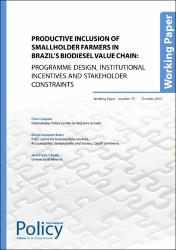Please use this identifier to cite or link to this item:
https://repositorio.ipea.gov.br/handle/11058/15585Full metadata record
| DC Field | Value | Language |
|---|---|---|
| dc.contributor.author | Zapata, Clovis | |
| dc.contributor.author | Vazquez-Brust, Diego | |
| dc.contributor.author | Plaza-Úbeda, José | |
| dc.date.accessioned | 2024-10-04T00:00:54Z | - |
| dc.date.available | 2024-10-04T00:00:54Z | - |
| dc.date.issued | 2010 | |
| dc.identifier.uri | https://repositorio.ipea.gov.br/handle/11058/15585 | - |
| dc.description.abstract | One of the principal challenges in sustainable development, especially in developing countries, is to build institutions that generate positive environmental and social externalities by helping individuals to perceive a positive relationship between self-interest and “the common good”. Collective engagement can enable individuals to overcome self-interestedness and work toward shared goals, but “getting the institutions right” requires an understanding of how the particular set of market and non-market relationships really work for participants. In the context of the biodiesel value chain in Brazil, this paper explores how institutional arrangements need to evolve if they are to foster the productive and sustained inclusion of small farmers and promote sustainable innovation as a regional economic development strategy, one that helps reduce social vulnerability without increasing environmental risks. The paper uses the institutional analysis and design (IAD) framework, which looks at how actors are involved in repetitive situations affected by a biophysical world, a cultural world and a set of rules, in order to understand how different institutional structures can accommodate the power of both internal and exogenous forces that shape the trajectory of sustainable innovation. After a general overview of stakeholders and policy instruments in the biodiesel programme, the paper provides a brief institutional analysis of the interaction between actors and processes, with a view to offering insights into the current effectiveness of the programme as a sustainable rural development tool. (...) | en |
| dc.language.iso | en | |
| dc.title | Productive Inclusion of Smallholder Farmers in Brazil’s Biodiesel Value Chain: Programme Design, Institutional Incentives and Stakeholder Constraints | en |
| dc.type | Working Paper | |
| dc.rights.holder | International Policy Centre for Inclusive Growth | |
| dc.rights.holder | United Nations Development Programme | |
| dc.location.country | Brasil | |
| dc.description.physical | 29 p. : il. | |
| dc.rights.type | Licença total exclusiva | |
| dc.rights.license | O texto e dados desta publicação podem ser reproduzidos desde que as fontes sejam citadas. Reproduções com fins comerciais são proibidas. | |
| dc.subject.keyword | Productive Inclusion | |
| dc.subject.keyword | Smallholder | |
| dc.subject.keyword | Farmers | |
| dc.subject.keyword | Brazil | |
| dc.subject.keyword | Biodiesel | |
| dc.subject.keyword | Institutional Incentives | |
| dc.subject.keyword | Stakeholder Constraints | |
| ipea.access.type | Acesso Aberto | |
| ipea.researchfields | N/A | |
| ipea.classification | Desenvolvimento Social | |
| ipea.classification | Meio Ambiente. Recursos Naturais | |
| ipea.classification | Agricultura, Pecuária e Pesca | |
| ipea.classification | Cooperação Internacional. Relações Internacionais | |
| ipea.classification | Tecnologia. Inovação. Informação. Conhecimento | |
| Appears in Collections: | Publicações do IPC-IG | |
Files in This Item:
| File | Description | Size | Format | |
|---|---|---|---|---|
| en_IPCWorkingPaper73.pdf | 399.62 kB | Adobe PDF |  View/Open |
Items in DSpace are protected by copyright, with all rights reserved, unless otherwise indicated.

